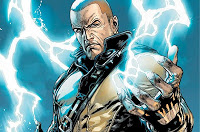My Long Road to Finishing inFamous (Part 2 of 2)–I’m An Unfocused Gamer
The older I get, the less interested I become in actually reviewing games, and the more interested I become in discussing my experiences with them, and what I learn about myself when I play them.
As I talked about in my last post, it took me three years to finish the first inFamous game. Had I not gotten a copy of inFamous 2, I probably never would have gone back to finish the first game. But I did, and I really liked the game, and that got me thinking. How many other games have I walked away from early on, and missed out on an interesting experience? What does that say about me as a gamer? Is finishing a game the exception rather than the rule for me?
Off the top of my head, here’s a quick list of games that I started but walked away from in the past year or so:
Uncharted: Golden Abyss (Vita)
Resistance: Retribution (Vita)
Section 8: Prejudice (Xbox Live)
MLB ‘12 The Show (Vita)
Mortal Kombat (Vita)
Metal Gear Solid 3D: Snake Eater (3DS)
LEGO Batman 2 (DS)
Bit.Trip Saga (3DS)
Battlefield 3 (XBox 360)
Cthulhu Saves the World (XBox Live)
Dead Island (Xbox 360)
Shank 2 (PSN)
Super Stardust Delta (Vita)
Shadows of the Damned (PS3)
Two Worlds II (Xbox 360)
Here are the games I bought, never started, and traded in for something else:
Gears of War 3 (XBox 360)
Uncharted 3 (PS3)
Here are the games I actually played through to completion, or am actually engrossed in:
inFamous (PS3)–completed
Dark Souls (PS3)–completed 100-hour campaign and am 20 hours into second playthrough
Saints Row: The Third (XBox 360)–completed
Mass Effect 3 (XBox 360)–completed and played the last 3 hours again for the “Extended Cut”
Deus Ex: Human Revolution (PS3)
Enslaved: Odyssey to the West (PS3)
The Walking Dead: Episode One–completed, but it was short
Minecraft (XBox Live)–at least 15 hours in and completely addicted
Hot Shots Golf: World Invitational–easily my most-played Vita game
Marvel Pinball (PSN)–I’ve put several hours into this one
Sound Shapes (PS3)–about halfway through and loving it
So, judging from that list, I actually finish very few games. In fact, most of the time, I start a game and play for a few hours, then walk away. That’s my most frequent pattern of behavior as a gamer, which is kind of disturbing to me. Most of those games on the first list I bought brand new at retail for $60 (or $40 for the Vita/3DS games). That’s a whole lot of money I threw away on games I didn’t spend a lot of time with. With Gears 3 and Uncharted 3, I probably got $40-50 in trade for $120 worth of games I didn’t play. Not a good return on my investment.
So what else do these lists tell me? Well, I can see that I certainly like RPGs and games with heavy RPG-like elements. Really, Marvel Pinball and Sound Shapes are the only one on the “finished/engrossed” list that don’t fit that description (yes, even Hot Shots has RPG elements). Many of those games on my “finished/engrossed” list also either have a strong story (Mass Effect, Deus Ex, Enslaved) or let you create one for yourself (Dark Souls, Minecraft). They also have immersive worlds to explore an, in some cases, get lost in (inFamous, Saints Row, Dark Souls, Mass Effect, Deus Ex, Minecraft).
My takeaway from all this is that I tend to enjoy the games I can get lost in, but that I frequently leave a game before giving myself enough time to get lost in it, which is counter-intuitive. One way to fix this is to not get caught up in the idea of needing to get a game when it first comes out, but rather getting it when I actually have time to give it a fair shake. Also, instead of juggling fifteen games at the same time, I can focus in on one or two, and really devote some time into completing them, or at least spending enough time with them to make an informed judgment.
I’ll post in the future about how well I’m actually sticking to this strategy. My first order of business will be to revisit a couple of games on that first list and see if I can get back into them. I think Dead Island will be my first challenge, as I had a lot of fun with it before walking away.



